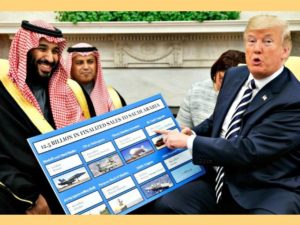 In part because America has failed to settle on a coherent, long-term foreign policy strategy in the Middle East. America is far from victory in Syria, Iraq, and Afghanistan whether against ISIS, Iran, or Al Qaeda. I thought President Trump could save Obama‘s failed American Middle East policy, but he managed to make America less effective in the Middle East than President Obama did. President Obama did not agree with Turkey’s President Erdogan to set up a safe zone for Syrian refugees on the Turkish border, let the Russians run the Syrian and Middle Eastern policy, failed to check Iran’s Middle East leadership ambitions, and sat passively while Syria engaged in a bloody war. President Trump has excelled in this devolution. Donald Trump’s top senior foreign policy advisers, Secretary of State Mike Pompeo and National Security Adviser John Bolton were recently in the Middle East trying to explain the American policy, particularly on Syria, while reassuring both the Arabs and the Israelis that the US is not abandoning the region as they leave Syria, but instead, they are only abandoning the Kurds in Syria. At the same time American military leaders voiced disagreement with and regret for President Trump’s plan to withdraw from Syria.President Trump announced on Twitter that America has defeated ISIS in Syria, which was America’s only reason for being there. Initially America went to Syria not because ISIS was there but because it wanted to remove the Syrian leader Assad because Assad is a bad guy; he was not ruling his country based on democratic rules and was not protecting the rights of minorities, such as Kurds, Alawites, and Greek Orthodox as well as Armenian Christians, so that they wanted to remove him and bring democracy to Syria, But they shifted the focus from toppling Assad to defeating ISIS. Assad is still in power, ISIS is still on its heels, Iran is still ruling Syria with its influence in Syria prevailing.
In part because America has failed to settle on a coherent, long-term foreign policy strategy in the Middle East. America is far from victory in Syria, Iraq, and Afghanistan whether against ISIS, Iran, or Al Qaeda. I thought President Trump could save Obama‘s failed American Middle East policy, but he managed to make America less effective in the Middle East than President Obama did. President Obama did not agree with Turkey’s President Erdogan to set up a safe zone for Syrian refugees on the Turkish border, let the Russians run the Syrian and Middle Eastern policy, failed to check Iran’s Middle East leadership ambitions, and sat passively while Syria engaged in a bloody war. President Trump has excelled in this devolution. Donald Trump’s top senior foreign policy advisers, Secretary of State Mike Pompeo and National Security Adviser John Bolton were recently in the Middle East trying to explain the American policy, particularly on Syria, while reassuring both the Arabs and the Israelis that the US is not abandoning the region as they leave Syria, but instead, they are only abandoning the Kurds in Syria. At the same time American military leaders voiced disagreement with and regret for President Trump’s plan to withdraw from Syria.President Trump announced on Twitter that America has defeated ISIS in Syria, which was America’s only reason for being there. Initially America went to Syria not because ISIS was there but because it wanted to remove the Syrian leader Assad because Assad is a bad guy; he was not ruling his country based on democratic rules and was not protecting the rights of minorities, such as Kurds, Alawites, and Greek Orthodox as well as Armenian Christians, so that they wanted to remove him and bring democracy to Syria, But they shifted the focus from toppling Assad to defeating ISIS. Assad is still in power, ISIS is still on its heels, Iran is still ruling Syria with its influence in Syria prevailing.
By contrast to America’s aspirations, Iran has more power in Syria as well as in Lebanon, which is now under the influence of Hezbollah, the political and militant Shi'ite Muslim group based in Lebanon. Global powers will not ever expel the terrorist groups that take on an Islamic name to achieve their political interests. Much like Al Qaeda, the ISIS sprung up because of the global powers’ desire to divide and conquer the oil rich Middle East. While it would be difficult to prove that the global powers cause such terrorist groups, as some argue, it is clear that the foreign policies of these states foment political unrest among those who already hate the US and its allies. In addition, failed states leave a power vacuum so that these terrorist organizations that are seeking a political space rush in.
At present America’s Middle East policy revolves around three goals: to secure oil, to counter Iran’s growing power in the region, and to protect the security of Israel. To accomplish those, it needs to weaken both Palestine’s Hamas and Lebanon’s Hezbollah. The fact is that global powers have a long history of backing terror groups to accomplish their ends. If states did not sponsor terror groups, they would not be successful. The global powers are using the terror group in several ways— to attack its enemies in the Middle East, Africa, or Asia; to serve as a pretext for global powers’ and the U.S military’s intervention abroad, and to use it as a propaganda tool at home for a domestic threat. Sometimes a government uses this pretext to increase surveillance on its citizens. We have seen this during President Obama’s administration as the government increased its power to watch its citizens, instead of the citizens keeping check on the government as the Founding Fathers intended. But we do not see much criticism from the left wing mainstream media about this surveillance, so leaders use terrorism as an excuse to justify their measures.
When President Obama came to power, we heard his first speech, “A New Beginning” to the Arab and Muslim world from Al – Azhar University, the famous Islamic university in Cairo. Obama promised that he would open a new chapter with the Muslim and Arab world. Instead, President Obama killed more people with drones in Pakistan and in Afghan than President Bush did in Iraq. In the speech he set a new vision for the US’s relationship with the Islamic world. The truth regarding Obama’s June 2009 speech, however, is that he failed to act decisively during the Arab Spring or the rise of Syrian brutality on its own people in spite of the boundless optimism the American President engendered by his Arabic greeting of assalamu alaykum, his quotations from “the Holy Qu’ran,” his celebration of Islamic history and contributions, and his apology for and confession about the US’s historical lack of justice in the Muslim world.
By contrast, Secretary of State Pompeo spoke at the American University in Cairo laying out a very different vision of American foreign policy in the Middle East. In a sense his speech was a repudiation of President Obama’s genuflection and celebration. Pompeo said that while Hezbollah has a major presence in Lebanon, the U.S will not accept the status quo. It was ironic that Secretary Popmpeo claimed that the U.S will not let Iran turn Syria into the next Lebanon but will instead act diplomacally with allied partners in Syria. In reality Iran and Russia are in charge of Syria, and few, if any, in the region take President Trump seriously anymore. I would agree with President Trump that the US should not militarily intervene in the nation building process and that governments need to own and solve their own problems for themselves, but for Pompeo to claim that the US would soon complete the eradication of ISIS and stymie the efforts of Iran in Syria was at minimum inconsistent with President Trump’s announcement that he was withdrawing US troops from Syria.
I think Secretary Pompeo was trying to create Arab unity against Iran. But Arab countries have a different view toward Iran. Because people in the region do not trust or believe either Trump or Obama and because they believe that America has destroyed the region, they presuppose that Washington will leave without resolving the turmoil that it created. Thus, Secretary of States Pompeo’s visit to the Middle East is not going to produce any fruit at all. The facts are that President Trump’s announcement of withdrawal from Syria has brought fear for the allies, especially the Kurds. Unfortunately, America uses the Kurds for its own ends, and then leaves them on their own to suffer the consequences of having befriended and supported the US. This week, however, Pompeo informed his Turkish counterpart, Mevlut Cavusoglu, that the US insisted on the protection of the US-backed People's Protection Units (YPG) in Syria, a group Turkey considers a terrorist organization allied with its own enemy the Kurdish Workers’ Party (PKK), a Kurdish militant force in Turkey. The Syrian Kurdish fighters spearheaded the Syrian Democratic Forces (SDF) operations to remove ISIS and gained a large territory in Syria in 2014. Pompeo also reiterated the US’s commitment to help secure the Turkish-Syrian border, but Ankara still intends to create a “security zone” in Northern Syria by driving out the Kurdish YPG, who fear that the US’s withdrawal will result in many Kurdish fatalities.
In another development in the Middle East, this week the US State Department has announced that in February it will hold a peace summit in Warsaw, Poland to control Iran and Russia and to shape the Syrian political future. During an interview Secretary of State Pompeo revealed that the goal of the international meeting is to “focus on Middle East stability and peace, freedom and security here in this region, and that includes an important element of making sure that Iran is not a destabilising influence.” This global summit’s invitation list did not include Iran, and, of course, Russia decline to join.
The goal of the Polish summit is curious because while participants will include some of the so called “Friends of Syria,” a group of over 100 nations formed in 2012 to overthrow Assad, the main ones in the group fighting in Syria— the United States, France, the United Kingdom, Saudi Arabia, Jordan, Qatar, and Turkey—could not topple Assad. Some of the these countries are now trying to open up their embassy in Syria. The American foreign policy is not consistent with reality in the Middle East. The main concern for America is that America does not want to be the border guard for Syria, Turkey, and Iraq, and Washington believes that sooner or later groups in the region will go to war to take the borders in Syria and Iraq, a battle America does not want to fight.
Granted, Trump has served the conservative agenda, especially in terms of social issues, but I think he is not a man of God. Trump calls everyone who makes charges against him a liar, but he himself is chief among them. Often his promises and his actions do not align. I believe Trump is an arrogant man, and clearly God opposes the proud but lifts up the humble. Further, Trump seems to be motivated entirely by money, so the future will tell if his arrogance and greed lead to his being humbled. In the interim, his Middle East policy seems as adrift as he appears to be. No doubt Syria was a failing state under the Obama administration, but President Trump, like his predecessor, has expedited the crumbling of US interests in the region, particularly in prematurely declaring victory when in reality Iran, Russia, and terror groups have achieved the victory.
Dr. Aland Mizell is President of the MCI and a regular contributor to Mindanao Times. You may email the author at:aland_mizell2@hotmail.com

